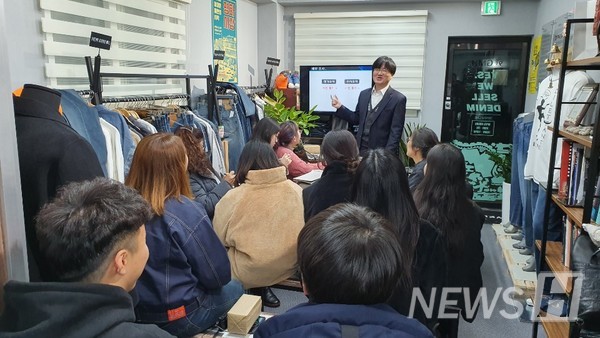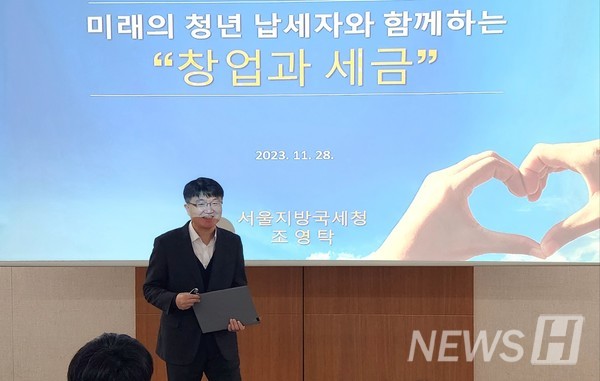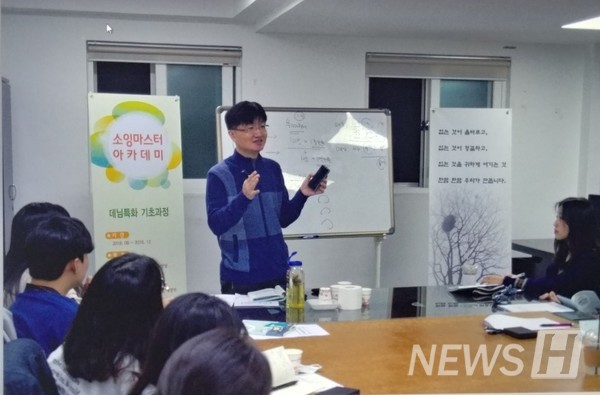Cho has volunteered to assist sewing business owners with tax affairs
He provided great help to small sewing business owners by leading a business registration campaign
"I feel greater happiness from giving than from receiving"
Cho Young-tak (Class of '87, Department of Economics, now School of Economics and Finance), an alumnus who has been serving as a tax officer at the National Tax Service for 31 years, has assisted small sewing business owners with tax affairs for the past 15 years. In addition to supporting small sewing business owners, he has also provided tax consultations and lectures to young adults preparing to start their clothing businesses.
To learn more about his story, we spoke with Mr. Cho, who first started by donating his talent to do "what I can do most easily" and now working to revitalize the sewing industry.

Volunteer that started with a promise to himself
While preparing for a career as a public servant, Cho made three promises to himself. The first was to buy a good audio system for his home because he loved music; the second was to send his parents on vacations overseas; and lastly to contribute to society by giving back and volunteering as a public servant. "Sharing what I've learned and done throughout my career was the easiest thing I can do," said Cho. "Since it was something I was good at, it was even easier to start volunteering."
It was in 2009 when he visited a children's study room, used by the child of sewing factory workers in Changsin-dong. The sewing industry worker asked Cho about taxes, and as he answered their questions, he became aware of the difficult reality faced by small sewing business owners. At the time, most of them had not registered their businesses. Many lacked an understanding of business registration and had a vague knowledge that "business registration means paying a lot of taxes."

"Small sewing businesses are micro-businesses, so there are many tax exemptions available for them," said Cho. "I launched a business registration campaign where I gathered and educated small business owners who didn't know about this." At the same time, he added, "I decided to start lecturing on taxes after completing the most basic step—business registration."
When he initiated the campaign, online shopping started to become popular with the release of smartphones. Business registration was required when sewing businesses sold clothing online, so his campaign also stepped up. As a result, over 300 sewing business owners registered their businesses. In 2012, a nonprofit organization, the Seoul Sewing Industry Association was founded.
"Working for the revival of the sewing industry"
In 2016, Cho and the nonprofit organization sought new ways to revitalize the sewing industry, which has been struggling since it gave away the global top position it had once secured in the 1960s with the rise of China. They focused on the fact that university students majoring in clothing & textile or fashion design had limited exposure to the field experience.
After completing business registrations, individual sewing business owners actively utilized corporate donation programs (where large companies receive tax deductions for donating to small businesses) to establish a nonprofit organization. With funds from the donations, they recruited university students who lacked practical experience. Recruited students learned and traded with six-month internships at sewing factories. Many of these students later used their acquired skills to start their own businesses and Cho offered them tax advice and lectures.
Since 2018, Cho has been offering tailored tax literacy lectures to young aspiring fashion designers preparing to start a business. He spent his own money to buy and give away books on tax and tumblers to the students, encouraging them along the way. His dedication extended to giving free lectures at the Sewing Master Academy, an institution that nurtures talent in the sewing industry.

"Why the sewing industry?"
Why the sewing industry? He explained, "Today, the semiconductors industry is the leading industry in Korea, but it is the textile and sewing industry that led Korea's economy in the 1960s and 1970s," adding, "As I started volunteering, I felt it was important that people not forget the contributions of those who came before us."
The sewing industry where business registration became a standard practice leads to greater economic transparency each year. Without the business registration of sewing factories, the entire process of supplying and selling goods from small sewing factories to Dongdaemun Market becomes opaque.
However, once sewing factories register their businesses, both suppliers and buyers are required to report their transactions to the government, so it can improve transparency. "Seeing the sewing industry become more transparent firsthand has been incredibly rewarding," said Cho. "It feels like we are taking steps toward reclaiming the past glory."
Greater happiness in "giving" than "receiving"
The reason why Cho was able to continue his volunteering journey was because "there is a greater happiness in giving than in receiving." He reflected, "Through the volunteer that I happened to start, I learned there is a greater happiness in 'giving' than in 'receiving'," adding, "Volunteering also helps me who feels happiness from giving."
Lastly, Cho offered some advice to Hanyang students.
"College is a golden period in your life. It's important not only to study but also to make good friends. To build good relationships with friends, you must first become a good person. You first have to work on yourself before giving to your friends. I hope you all make great friends!"


 '한양위키' 키워드 보기
'한양위키' 키워드 보기